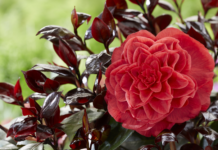
There have been suggestions in several quarters that there might be opportunities for food (or indeed amenity horticulture!) companies to present their products as “affordable luxuries” and thereby get a lift in the otherwise dismal climate through which we continue to struggle. This is often referred to in some quarters as the ‘lipstick phenomenon’ – lipstick sales are said to boom in a recession as it is an affordable luxury that boosts morale.



There have been suggestions in several quarters that there might be opportunities for food (or indeed amenity horticulture!) companies to present their products as “affordable luxuries” and thereby get a lift in the otherwise dismal climate through which we continue to struggle. This is often referred to in some quarters as the ‘lipstick phenomenon’ – lipstick sales are said to boom in a recession as it is an affordable luxury that boosts morale.


Accenture published a document on Luxury Shopping in November of last year which reported on a survey they undertook in the US. Fifty-three per cent (53%) reported themselves as likely to purchase “specialty/gourmet food and drinks” as opposed to fifty per cent for luxury personal care products which would include the much vaunted lipstick. Rabobank have spoken of what they term the Hybrid Consumer in describing trends in retailing whereby they see consumers reaching on the one hand for value offerings, but on the other for premium options – or “Simple Pleasures” to use the terminology from our Consumer Lifestyle Trends.
Leaders in a number of categories have spoken of such an opportunity. Diageo in alcoholic beverages particularly via cocktails; Unilever would claim to have experienced it with their Magnum range of ice cream. KPMG have written about the “luxury buyer” in the chocolate category in terms similar to the Rabobank analysis, pointing out how brands such as Godiva and Lindt have become ‘mass market’ items and how mainstream producers have acquired ‘artisan’ brands. However, a colleague reported Kantar data showing premium chocolate to have declined by a whopping 21% in the Republic of Ireland, so maybe the reality is different form the analysts’ theory!
Finally, the introduction of Lidl’s Deluxe range does imply that even a hard discounter can play both sides of Rabobank’s Hybrid Consumer and they might be receptive to proposals for such products in new categories.






